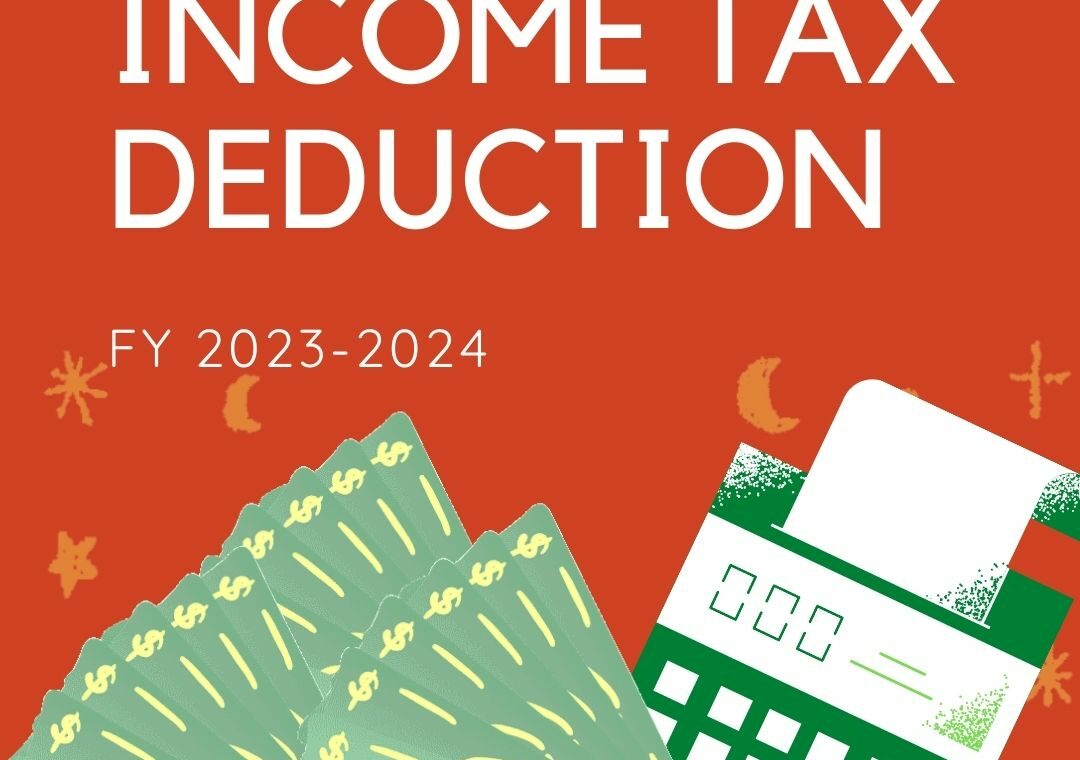As the financial year of 2023-24 approaches, the discussion of income tax deductions has already started to buzz among taxpayers. With the onslaught of the new financial year, everyone is prepping up to make the most of their income tax deductions so that they can save some money, while also staying updated with the changing income tax laws. This article will delve into the various income tax deduction opportunities available to taxpayers in the financial year 2023-24 and provide helpful tips to make the most out of these deductions.

Definition of income tax deduction
Income tax deduction is a reduction in the taxable income of an individual or entity. It can be in the form of a percentage of the total income, or a flat amount deducted from the total income. It reduces the amount of income subject to taxation and is an effective way to reduce the overall tax burden. Tax deductions can be taken for various purposes such as charitable donations, medical expenses, and retirement savings.
Overview of income tax deduction in India
In India, income tax is the amount an individual or a business pays to the government in taxes on the income earned during a financial year. Income tax is one of the primary sources of revenue for the government. It is used for the development of the country, for providing welfare and public services and for meeting other expenses.
Income tax in India is divided into two categories– direct and indirect taxes. Direct taxes are those that are paid directly to the government by the taxpayer, while indirect taxes are taxes levied on goods and services. In India, tax deductions are allowed to those who are eligible and fall under certain categories such as salaried individuals, business owners, agricultural workers and so on. Tax deductions are those amounts that are deducted from the total taxable income before calculating the tax liability. These deductions are available under different sections of the Income Tax Act.
Eligibility for Income Tax Deduction in FY 2023-24:
The 2021–22 financial year is fast approaching, and with it comes the opportunity to save money on your taxes through income tax deductions. To make the most of your deductions, it is important to understand the eligibility requirements and types of deductions available.
A. Requirements for eligibility: In order to be eligible for income tax deductions in FY 2023–24, individuals must meet certain criteria. These include being an Australian resident for tax purposes, having earned income in the financial year, and having a valid Tax File Number. To be eligible for certain deductions, individuals may also need to provide proof of their employment status or have a valid receipt for their expenses.
B. Types of deductions available: There are numerous types of deductions available in FY 2023–24, ranging from work–related expenses to charitable donations. These deductions can help to reduce the amount of taxable income an individual has to declare on their tax return. Common deductions include expenses such as travel, self–education, and medical expenses. There are also deductions available for home office costs, tax–deductible gifts, and superannuation contributions.
By understanding the eligibility requirements and types of deductions available in FY 2023–24, individuals can make the most of their taxes and save money. Taking the time to research and understand these deductions can make a big difference when filing taxes in the new financial year.
Benefits of Income Tax Deduction
Income tax deductions can be a great way to save money and reduce your overall tax liability. By taking advantage of deductions, you can keep more of your hard–earned money in your pocket and use it for other important things. A few of the major benefits of income tax deduction include increased savings and lower tax liability.
Increased saving: First, when you use tax deductions, you can save more of your income for important expenses, such as retirement, education, or a down payment on a home. By taking advantage of deductions, you can reduce your taxable income and keep more of your earnings for yourself. This can help you save more for retirement, college, or other future expenses.
Lower tax liability: Second, when you use tax deductions, you can reduce your tax liability. By lowering your taxable income, you can reduce the amount of taxes you owe each year. This can help you keep more of your money and use it for other needs.
Overall, income tax deductions can be a great way to save money and reduce your overall tax liability. By taking advantage of deductions, you can keep more of your hard–earned money in your pocket and use it for other important things.
Commonly Used Deductions
The Indian Income Tax Act offers several deductions under different sections of the Act to taxpayers. These deductions have made it easier for individuals to save money and plan their finances in an effective way. Some of the commonly used deductions include A. Section 80C deductions, B. Section 80D deductions and C. Section 80E deductions.
A. Section 80C deductions are those deductions that can be claimed for investments and expenses like life insurance premium, contribution to pension funds, tuition fee of children, principal amount of home loan, etc. You can claim a maximum deduction of up to Rs. 1.5 lakhs under this section.
B. Section 80D deductions are those deductions that can be claimed for medical insurance premiums paid for oneself, spouse and children. You can also claim deduction for preventive health checkups for yourself and dependents. The maximum deduction under this section is Rs. 25000 for individuals below the age of 60 and Rs. 50,000 for individuals above the age of 60.
C. Section 80E deductions are those deductions that can be claimed for the interest amount paid on the education loan. This deduction can be claimed irrespective of the amount of interest paid and can be claimed for a maximum period of 8 years. These deductions have helped taxpayers to save a significant amount of their hard-earned money. It is important to understand the various deductions available and plan your taxes accordingly.
FAQ
What are the tax rates for 2023–24?
The tax rate for individuals earning up to Rs. 50 lakhs are 10%. Above Rs. 50 lakhs and up to Rs. 1 crore, the tax rate is 20%. For income over Rs. 1 crore, the tax rate is 30%.
Are there any deductions available for home loan interest?
Yes. Home loan interest up to Rs. 2 lakhs are eligible for deduction under Section 24 of the Income Tax Act.
Are there any deductions available for medical insurance premiums?
Yes. The maximum deduction for medical insurance premiums is Rs. 25,000 under Section 80D of the Income Tax Act.
Are donations eligible for deduction?
Yes. Donations up to 10% of the gross total income are eligible for deduction under Section 80G of the Income Tax Act.
Are there any deductions available for education expenses?
Yes. Tuition fees for children up to two children are eligible for deduction under Section 80C of the Income Tax Act.
Is there any deduction available for capital gains?
Yes. Capital gains up to Rs. 1 lakh are eligible for deduction under Section 54 of the Income Tax Act.
Are there any deductions available for investments?
Yes. Investments in certain government–approved schemes such as PPF, NSC, ULIP, etc. are eligible for deduction under Section 80C of the Income Tax Act.
Are there any deductions available for investments in tax–saving mutual funds?
Yes, deduction in ELSS mutual funds investment is eligible under Section 80C of the Income Tax Act.
Are there any deductions available for rental income?
Yes. Rental income is eligible for deduction under Section 24 of the Income Tax Act. The maximum deduction for rental income is Rs. 2 lakhs.
Conclusion
“The tax deductions enable us to save money and make our life easier. As famous saying goes, “The cost of a thing is the amount of what I will call life, which is required to be exchanged for it, immediately or in the long run.” Let’s make sure we make the most of our income tax deductions and make the most of our hard-earned money in FY 2023-24.












